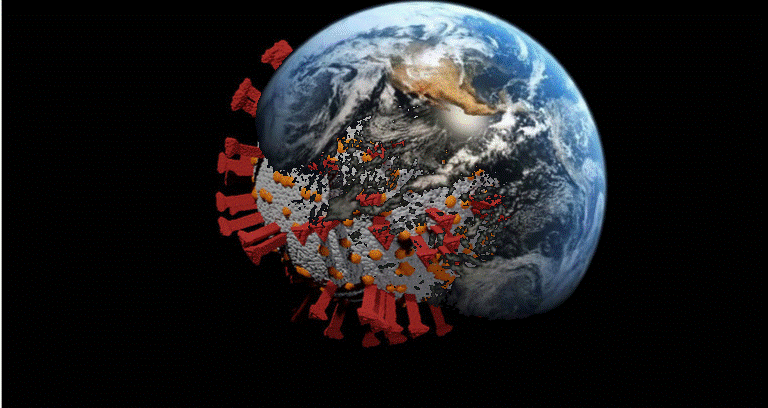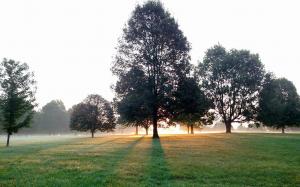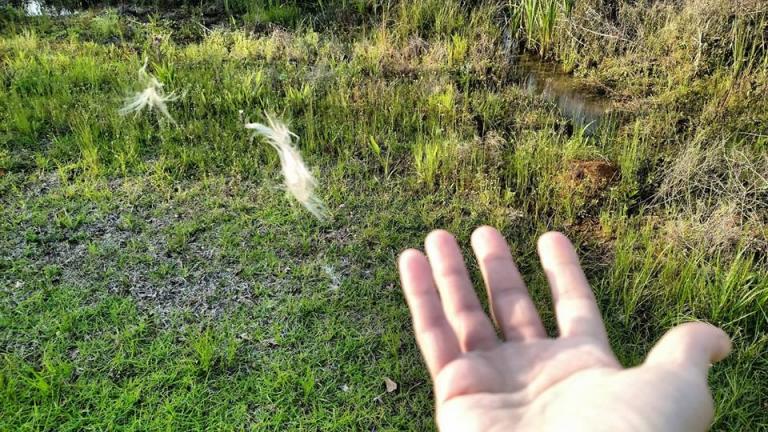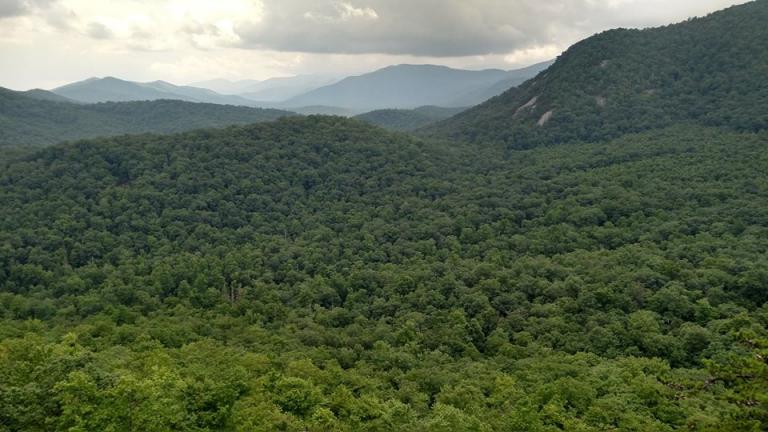There is one bright spot I can see in the coronavirus pandemic. It’s not just for humans—it’s for the planet.

This might be the first time since the beginning of the Industrial Age that Earth is finally getting a break from the relentless activity and growth of human industrial production.
Studies are showing that pollution levels have dropped significantly in areas of massive lock-downs and quarantines. The end of the incredibly destructive fracking industry could be hastened by the pandemic. There is also a growing appreciation for the beauty and solace of nature which we can enjoy even within the confines of social distancing.

Of course, the level of suffering—especially for vulnerable populations and those without resources—is severe. I’m not denying that at all. But as a friend of mine said, “I can almost feel the planet breathing a sigh of relief to have humans slow down, stay home, and stop their relentless activity.”
I happen to be teaching an online course on Environmental Ethics in this midst of this pandemic.
The students and I have discussed the ways in which the virus is reshaping how they think about our response to the climate crisis. One of my students, Laura, shared, “I was wondering if some of the required changes needed to reduce our energy consumption might be received as more reasonable. In other words, now that many in the US have been required/encouraged to make drastic changes (such as sheltering-in-place for entire communities), will our nation be more receptive to changes needed to address the climate crisis?”
She is hopeful: “I believe in the power of creativity and innovation. Perhaps we can collaborate to help one another while at the same time looking for new ways to help our planet heal.”
I, too, have wondered if humanity will learn the lessons of this crisis and see that making massive changes is not only possible, but necessary. [See: “6 Lessons Coronavirus Can Teach Us About Climate Change”]
Will we start to wake up and realize that “business-as-usual” is what has contributed to this crisis? Will we refuse to go back to the status quo that was so damaging to people and the planet? [This article points out the ways in which the virus has exposed the ridiculous and harmful aspects of our system’s “rules.”] Or will we acquiesce and accept these practices once things “get back to normal”?
My concern is that there may be a “bounce back” where people go wild with consumerism and energy consumption after the virus has passed. For example, you can watch this video to see how the emissions in China go down when they’re all in quarantine, but then start to rise once restrictions are lifted.
So it caught my attention when I noticed new terminology emerging about the need—and feasibility—of a new way of being and doing in the world going forward.
Phrases like “planned economic slowdowns” and “intentional degrowth” are coming to the fore.
For those of us in the Judeo-Christian tradition, we know the Bible was way ahead of the game with this concept of “planned economic slowdown.”
It’s called SABBATH.

God commanded that the enslaved Israelites be given a full day’s cycle to rest each and every week (Ex. 31:13-17, Ex. 23:12, Deut. 5:13-14). In Egypt, they were forced to work without rest. The empire allowed them no time to worship or enjoy a reprieve from their oppressive labor. We know what happened when Pharaoh refused to submit to God’s commands. Ten plagues swept through the land. The Earth itself rose up against the empire, exacting a tragic toll on human life.
Today, the industry and commerce Pharaohs have brought ecological disasters upon us, and we are suffering from one plague after another that is exacting a tragic toll on human life.
But it doesn’t have to be this way. We can draw on the wisdom of the Hebrew scriptures and learn the lessons that can guide us to restructure our world in a healthier, more equitable way.
Not only did God call for a Sabbath on the seventh day, but also stipulated in Leviticus 25 that there is to be a Sabbath year!
“In the seventh year there shall be a sabbath of complete rest for the land, a sabbath for the Lord: you shall not sow your field or prune your vineyard. You shall not reap the aftergrowth of your harvest or gather the grapes of your unpruned vine: it shall be a year of complete rest for the land.” (Lev. 25:4-5)
What are they supposed to eat that seventh year? God promises that their crops will yield enough in the sixth year for three years if they follow this cycle. In other words, God promises abundance – but that abundance is predicated on regular rest and liberation of the land.
In fact, God holds Godself accountable to this same cycle of sabbath.
The first creation story of Genesis tells us that God took time to rest after the heavy lifting of creating the universe.
“And on the seventh day God finished the work that he had done, and he rested on the seventh day from all the work that he had done. 3So God blessed the seventh day and hallowed it, because on it God rested from all the work that he had done in creation.” (Genesis 2:2-3)
God trusts God’s good Creation to do what it has been designed to do – without dominating, micro-managing, or relentlessly pushing for more.
Yet the global human economy of our time knows no rest. It is a 24/7/365-day drive for growth at all cost.
There’s a word for that, too. It’s called cancer.
In the human body, cells that grow without rest, consume all surrounding resources, and take over the system are called “malignant” because they lead to death. The kind of growth envisioned by our consumerist culture is, indeed, leading to death. Whether it’s a microscopic virus that erupts when humans refuse to respect the wildness of land and creatures, or monster storms super-pumped by global warming that churn across the land, the results are catastrophic in biblical proportions.
I’ve noted with bitter irony that the virus is using the same tactics against the human body that humans have used against Earth’s body.
The virus attacks the lungs, multiplying and destroying the “respiratory tree” down to the tiniest alveoli that enable the exchange of oxygen into our bloodstream. Similarly, humans have pushed into forests and natural areas, destroying the very trees that create the oxygen we breathe.

Zoologists and disease experts explain that “changes to human behavior — the destruction of natural habitats, coupled with the huge number of fast-moving people now on Earth — has enabled diseases that were once locked away in nature to cross into people fast,” (https://www.msn.com/en-us/health/health-news/bats-are-not-to-blame-for-coronavirus-humans-are/ar-BB11qKvD). This is what has happened with the coronavirus. It made the jump from a market crammed with wild animals for sale in China to the humans who seek to profit from their exploitation.
It’s worth noting that in Leviticus, God delineates consequences for disobeying the commandments and refusing to honor God and neighbor—including the land itself.
Chapter 26:1-13 describes how the people will be blessed when they follow God’s commands. The earth will yield abundantly, and they will live in peace. But in verses 14-33, the consequences for refusing to live in accordance with God’s commands are described in graphic detail. “I will bring terror on you; consumption and fever that waste the eyes and cause life to pine away,” (v. 16). “I will break your proud glory, and I will make your sky like iron and your earth like copper,” (v. 19). “I will send pestilence among you, and you shall be delivered into enemy hands,” (v. 25). “I will lay your cities waste, will make your sanctuaries desolate,” (v. 31).
It’s hard to read these verses and not consider our current situation with the climate crisis and the coronavirus pandemic. This is not to say that the Bible “predicted” the state we’re in.
Rather, I’m making the case that there is ancient wisdom in these texts that can guide us for the conditions we face today.
For example, Leviticus 26:34-35 states: “Then the land shall enjoy its sabbath years as long as it lies desolate, while you are in the land of your enemies; then the land shall rest, and enjoy its sabbath years. 35As long as it lies desolate, it shall have the rest it did not have on your sabbaths when you were living on it.”
In other words, the Bible is saying that when humans refuse to give the land rest and respect the sabbath, the consequences are severe. God will ensure that the land is given its sabbath, whether humans cooperate or not.
I want to be clear that I do not personally subscribe to the idea that God reigns down terror as punishment for misdeeds—especially when the most vulnerable are the ones who suffer disproportionately. But the idea of consequences as a result of relentless, cancerous growth resonates strongly with me. There are foundational questions we need to raise about our refusal to give the land and people rest (Sabbath) and the unrelenting demands we make without consideration of the consequences (ecological plagues).
I’m also not calling for draconian measures to respond to the climate crisis that are on par with what is needed for the COVID-19 pandemic. As Vijay Kolinjivadi writes: “While some have called for climate change to be just as drastic as the one undertaken in response to the COVID-19 pandemic, it should not be. We need a just climate transition which ensures the protection of the poor and most vulnerable and which is integrated into our pandemic response. This would not only reverse the climate disaster we are already living in but also minimise the risk of new pandemics like the current one breaking out.”
There’s a biblical concept for this kind of system-wide societal justice, as well. It’s called the Jubilee Year.
It was to be a time when all property would be returned, debts forgiven, and the land given rest. It was to happen after the 49th year – the sabbath of sabbaths (7 x 7 = 49). In the 50th year they were commanded to take care of each other. No interest charged on debts. No price-gouging. “If any of your kin fall into difficulty and become dependent on you, you shall support them,” (25:35). The working poor are to be released from their debts. Everyone is set free, including the very Earth itself.
It is uncanny that on this 50th anniversary of Earth Day, Earth is finally getting its Jubilee Year.

One tiny virus is attacking us, slowing us down, and even stopping us in our tracks. So as Earth is finally getting the sabbath it needs, we can use this time to rethink our relationship with the planet going forward. We can make different choices that protect both Earth and our neighbors. Hopefully this pandemic will show us that not only are we capable of making different choices, but that we must.
Rather than being forced into an emergency stop, we can return to the ancient biblical wisdom of planned, regular, and complete rest for ourselves and God’s Creation. Is it so bad to have stores close at 9 p.m.? Would it be unbearable to have one day a week when everyone—workers and consumers alike—gets a day to rest? Can we understand the prudence of leaving forests and natural lands alone to live as God designed?
Put in a more positive way, can we establish policies that enable us truly care for each other in a systemic way? Can we work toward an economic system where interest is not charged on debt? Where everyone is assured the basic necessities of life? And we support those who have fallen on hard times? Where every seven years people are released from their debts? Where everyone is set free, including Earth itself?
I hope our answers to those questions are different than before the Age of COVID.
I’m choosing to align the hope of my student, that we will, indeed, “collaborate to help one another while at the same time looking for new ways to help our planet heal.”
I am rooting for a Jubilee.
Read also:
We’ve Lost the Climate War. It’s Time to Surrender.
Planet Earth’s Potsdam Declaration on Climate Change

Leah D. Schade is the Assistant Professor of Preaching and Worship at Lexington Theological Seminary in Kentucky and ordained in the ELCA. Dr. Schade does not speak for LTS or the ELCA; her opinions are her own. She is the author of Preaching in the Purple Zone: Ministry in the Red-Blue Divide (Rowman & Littlefield, 2019), Rooted and Rising: Voices of Courage in a Time of Climate Crisis (Rowman & Littlefield, 2019), and Creation-Crisis Preaching: Ecology, Theology, and the Pulpit (Chalice Press, 2015).
Leah’s latest book is a Lenten devotional centered on Creation: For the Beauty of the Earth (Chalice Press, 2020).
Twitter: @LeahSchade
Facebook: https://www.facebook.com/LeahDSchade/
For more information on “planned degrowth”:
This video from Our Changing Climate talks about lessons we need to learn from the coronavirus that can be applied to the climate crisis. Intentional economic slowdowns are “not only possible but necessary to cut emissions drastically.” The caveat is that a strong social net needs to be in place so that millions are not harmed by these vast structural changes.
Similarly, Vijay Kolinjivadi calls for a just climate transition that involves “economic reforms to introduce ‘planned degrowth’ that puts the wellbeing of people over profit margins” in his article “The coronavirus outbreak is part of the climate change crisis.”













